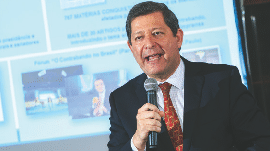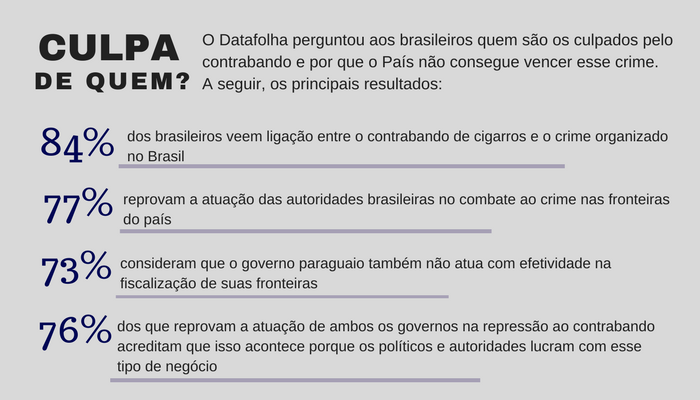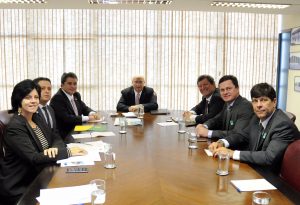This is the theme of the campaign supported by ETCO against smuggling, an evil that robs the market of national companies, fuels organized crime and bleeds public coffers.
The numbers are frightening: with this value, which corresponds to the wealth that Brazil stopped producing in 2016 because of smuggling, it would be possible to build more than 1,3 million popular houses, a thousand hospitals, 65 thousand daycare centers or 25 thousand public schools . These are losses that no country can afford to ignore - let alone let them grow year by year, as has been happening. The exhibition was one of the actions of the O Brasil que Nós Queremos campaign, carried out by the Movement in Defense of the Brazilian Legal Market. The Movement was created by ETCO and the National Forum Against Piracy and Legality (FNCP) and has the support of 70 entities. The objective is to join forces and mobilize authorities from the three branches of government and society in the fight against these illegal practices.
Watch: The Brazil We Want (video)
ORGANIZED CRIME
“The country in which we all want to live one day can only begin to be built if we leave aside the rhetoric and move on to immediate and effective change actions that have everyone's commitment,” says Edson Vismona, ETCO's executive president. In our experience, improving the business environment, simplifying entrepreneurial activities, and fighting corruption and illegality are the ways to reach this dream country. In addition to damaging Brazil economically, activities such as cigarette smuggling finance organized crime, increasing the levels of violence that afflict the population every day. What we need is to evolve, once and for all, from discourse to practice, with measures that actually monitor and curb these activities, encouraging the industry to return to invest and trade to sell. ”

Another campaign action involved the Folha de S. Paulo newspaper. Whoever went to the newsstands or received the publication at home on March 29 was surprised by the headlines on the front page. The main one said: "Paraguayan smuggling falls to the historic minimum". And the others brought other "good news" related to the problem, such as the victory of the State in the war against gangs that use contraband to finance drug trafficking and other crimes: "Public power resumes neighborhoods on the outskirts of São Paulo". Unfortunately, these were not real headlines, but an advertising jacket with news of the dreams of a country that had already managed to solve the problem of smuggling.
LEGISLATIVE SUPPORT
The problem was discussed by experts on August 3, at an event that was held at FIESP to commemorate the first State Day to Combat Smuggling in São Paulo. The date was established by a bill by Congressman Jorge Caruso (PMDB), from the recently formed State Front to Combat Smuggling. The objective is that every year, on that day, paulistas can debate the challenges and results of this struggle. “Smuggling is an activity dominated by gangs like the PCC. Criminals use
the profits generated by smuggling to finance other crimes such as drug and arms trafficking, ”says Caruso.
The São Paulo legislature follows the good example of the National Congress, which created a Parliamentary Front two years ago with the
same purpose, chaired by federal deputy Efraim Filho (DEM / PB).

“Efforts to combat illicit practices must be
unified. It no longer makes sense for the public authorities, parliament and organized civil society to act in isolation and uncoordinated, ”says Efraim.
In addition to harming the country's economy and development, smuggling brings products to the Brazilian market without quality control and hygiene, which endanger consumers' lives and health. The list includes everything from sunglasses that cause damage to the retina to sharp and sharp toys, unsuitable for children, and cigarettes with rat hair and cockroach paws, which end up being inadvertently consumed by the population. In the same vehicles and schemes used to smuggle these products, the
Criminal factions also bring weapons and drugs that fuel violence in large cities. “The fight against illegality
it is a struggle for life. The violence that is on the streets, and that frightens us so much, is financed by smuggling, ”says Vismona.
SUPPORT FROM THE MINISTRY OF JUSTICE
The Brazilian population agrees. In a recent survey conducted by Datafolha, at the request of the Movement for the Defense of the Brazilian Legal Market, 84% of respondents said they believed in the link between cigarette smuggling and organized crime.

Combating the problem requires a constant effort by all actors in society and the effective engagement of the Federal Government in the inspection of our borders. In March, as part of the O Brasil que Nós Queremos campaign, ETCO agreed with the Ministry of Justice to sign a protocol of intentions, which includes a set of measures and intelligence actions to
suppress smuggling in the national territory.
Only then, by joining efforts, will Brazil be able to get rid of this culture of illegality more quickly and, consequently, increase tax collection, invest more in social programs, curb the consumption of products harmful to the health of the population and reduce violence and violence. performance of organized crime in large cities.
“The Brazil we want is the country of order and progress, which generates wealth, jobs and development for all Brazilians”, reinforces Vismona.
Read more about it:






